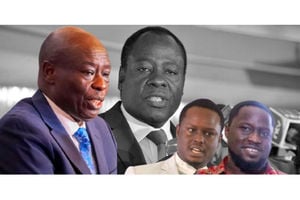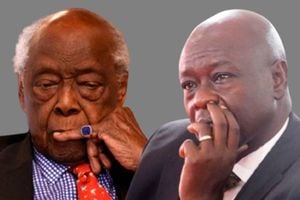Why Mali coup should jolt us

Demonstrators gather around a group of Malian soldiers during a protest to support the army following the recent coup.
What you need to know:
- They made President Ibrahim Boubacar Keita to resign and dissolve his government.
- President Keita showed a marked reluctance to pay heed to voices of dissent from an increasingly restive population
Today, Mali is only known as the birthplace of great musicians like Salif Keita and Mory Kante.
On August 18, a group of soldiers mounted a mutiny in a military barracks in central Mali, arrested senior officers, and then drove to the capital Bamako, on tanks and armoured vehicles, where they seized the president, prime minister and ministers.
They made President Ibrahim Boubacar Keita to resign and dissolve his government.
A day later, five military officers led by 38-year-old Colonel Assimi Goita announced they had seized power, and just like that, the country had a new leader.
Few people outside of Mali had heard of Col Goita, a bearded fellow who looks like a baddie in a low-budget cowboy movie, but he is now a reality, not only in the vast country, but also in West Africa.
How the international community, which has uniformly called for the reinstatement of the Keita government, handles the matter will be interesting to watch.
Decades of coups
In swift succession, the African Union, the European Union, the United Nations and the influential 15-member Economic Community of West African States (Ecowas), of which Mali is a member, told the junta in no uncertain terms they disapproved of the coup.
So did several individual European, North American and African countries, including economic giants like Algeria, Nigeria, Angola and South Africa.
The former two are interesting in the sense that they too have suffered decades of coups and counter-coups, while the latter two had to fight for independence long after the rest of the continent had been “liberated”.
The condemnations have ranged from slaps on the wrist to economic and military aid sanctions, but perhaps the most significant may turn out to be the move by Ecowas to shut the country’s borders.
Mali cannot survive when this happens for obvious reasons: all its trade and vital supplies are dependent on the goodwill of its neighbours.
The landlocked country is surrounded by six states—Algeria, Niger, Mauritania, Senegal, Guinea and Burkina Faso -- none of which welcomed the development.
Corruption
But he reasons for the latest coup cannot be glossed over. In his second term, President Keita showed a marked reluctance to pay heed to voices of dissent from an increasingly restive population, battered by a tanking economy, corruption and election fraud, as well as a never-ending insurrection in the north by motley bands of Tuareg separatists and jihadist expansionists.
Apparently, the way the Mali army prosecuted the fight-back in the north was not very impressive, even with help from French and UN peacekeeping forces.
Thus the coup that started as a mutiny can be blamed on widespread indigence and political turmoil, weak governance institutions and general insecurity — not on any particular fateful event. This sounds familiar, doesn’t it?
It is a pity that a Mali, a country rich in history and culture, has been reduced to such insignificance in world affairs that the hullabaloo about the coup is already waning.
This territory was the epicentre of vast empires – the Mali and Songhai empires from the 12th to the 16th centuries. That is how Mali and Songhai empires, standard fare in African history, came to be, and we came to find out something about great emperors like Mansa Musa and Askia Mohamed.
The mythical city, Timbuktu, was once the greatest trading centre in North and West Africa, where salt, spices, gold, ivory and slaves jostled for space, patronised by Arab, Jewish and Italian merchants.
It was also a centre of excellence in the 14th Century when the University of Timbuktu drew scholars from all over the Arab world.
Today, Mali is only known as the birthplace of great musicians like Salif Keita and Mory Kante.
Away from the tribulations in Mali which are not peculiar in the continent, it has baffled many how African governments are so vulnerable that a bunch of soldiers can stage a successful coup.
But for the time being, it would be more pertinent to find out why all former French colonies are either prone to coups or threatened by insurgency on huge swathes of their territories.
Is there something about French colonial rule that predisposes these artificial “geographical expressions” to coups, insurrections, invasions, extreme poverty and other forms of vulnerabilities? That would be an interesting area of research for African scholars.
Elected governments
Of late, overthrowing “democratically” elected governments has fallen out fashion, mainly because, with a few notable exceptions, the international community won’t stand for it.
In my view, the reason there were, in the past, so many coups was that democracy had not really taken root.
It still hasn’t; there are too many stolen elections, too many attempts to roll back democratic gains and too many elected leaders with a predilection for authoritarianism, which should be a warning to our own leaders.
We still haven’t learnt how to handle the evils of ethnic chauvinism, negative ethnicity, endemic corruption, or how to inculcate patriotism through involving the general public in governance.
Once these issues are sorted out, we need not fear that dislodging elected governments through unorthodox means will once more become attractive.





